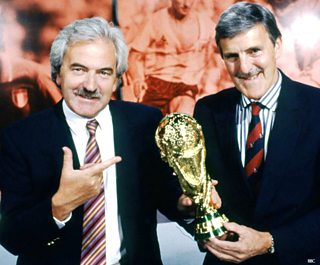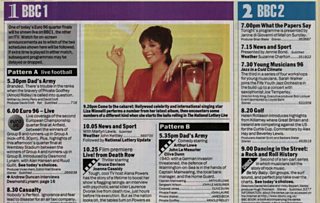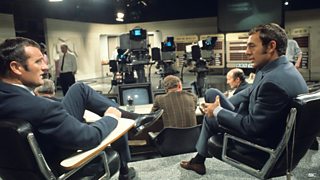
Soccer stalwarts Des Lynam and Jimmy Hill presided over the ��������'s 1990 World Cup coverage
From eating breakfast with Beckham to watching Pele in your pyjamas, there’s always something special about a football tournament on television.
Every two years, millions of people put everything on hold to watch top players in action morning, noon and night. As Euro 2016 heads towards its climax, how has the �������� covered previous football tournaments?
Things have certainly changed since the early days of football on TV. Of the first European Championships, held in 1960, only the second half of the final was shown on British screens, quaintly and vaguely billed as
At least it was broadcast live, though. For the held in Chile, satellite broadcasting was still in its infancy, and the Radio Times explained the logistics of bringing the games to British TV screens:
"Each film must be flown from Santiago to Lima, Peru - from Lima to Panama - Panama to Miami and Miami to New York. That takes approximately 14 hours. Then the 90 minutes of film must be processed in New York and rushed to Idlewild Airport to be put on the first available transatlantic jet.”
The aim was to get them on air within 48 hours, “if there is no fog on the route”.
By the 1970s, coverage had expanded somewhat. One odd side-effect of the limited coverage of domestic football in that decade is that during an international tournament, you’d often see more live football in a week than you would for the rest of the year put together.
Both the �������� and ITV provided extensive coverage of the 1970 World Cup. �������� One Controller Paul Fox bullishly announced in the Radio Times that the channel would not alternate matches with ITV because “When ��������1 and ITV show the same event, the large majority of the public prefer to watch it on ��������1. Whichever set of figures you look at, this is an unchallengeable fact.”

Schedulers went to great lengths to accommodate Euro 96
This blanket coverage was quite different to the rest of the year. Fearful of the spectator deciding to abandon the terrace for the armchair, no live coverage of league football was permitted, bar the hour of on a Saturday night - plus a further hour on ITV the following afternoon. Only the biggest occasions like the FA Cup Final and the annual England v Scotland game could be seen live as they happened.
In the tournaments, there were no such problems – both the �������� and ITV could show as much as they liked, and they made the most of it. In 1978, the action from Argentina and even the Nine O’clock News found itself demoted to ��������2.
Such was the excitement over that tournament – especially in Scotland where Ally’s Army were flying the flag for the whole of the UK – that the Hamilton by-election was to avoid voters staying at home glued to the TV.
In the 1980s, though, British football was in the doldrums, with concerns over increased hooliganism and tumbling attendances, and none of the home nations qualified for the 1984 European Championships. This meant the tournament was virtually invisible on our screens, with only two live matches and the rest relegated to late night highlights.
With England, Scotland and Northern Ireland all qualifying for the 1986 World Cup in Mexico, coverage returned to more familiar levels – but a number of matches had only their second halves shown live on TV, ensuring ��������1 could screen regular ratings winners like Wogan.

A relaxed moment captured behind the scenes of the 1970 World Cup studio
After the twin successes of Italia 90 and football's homecoming in Euro 96, coverage was bigger than ever before. So when it came to Euro 2008 and no home nation representation, a was shown and there was no 1984-style snub.
But it’s not just the matches that are the lasting legacy of a tournament. The stars, the presenters and the theme tunes all make an impact, even among those who have no interest in football. Pavarotti gained a new fanbase when Nessun Dorma became the theme of the 1990 World Cup.
The same tournament spawned , but it also helped make a star of Des Lynam, whose constant appearances on screen saw him reach a new audience. Indeed, when Arthur Smith wrote a TV play set during Euro 96, the icon of the tournament was not Alan Shearer or Stuart Pearce, but Des himself.
Major tournaments also see regular routines thrown out of the window as football swamps the schedules. In 1970 and 1986, it was a month of late nights for British football fans as the matches from Mexico ran late into the evening. The latter tournament saw a added to the schedules, partly so football crazy kids could keep up with the action.
It was back to the witching hour again with the 1994 World Cup from the USA with British fans operating in a totally different time zone for post-midnight kick-offs.

Just the slightest hint that the 1986 World Cup was held in Mexico...
In 2002, it was as the World Cup in Japan and Korea saw bleary-eyed supporters set their alarms for the early hours. The normal breakfast fare of news, weather and travel was binned for Denmark v Senegal and many lives were turned upside down for a month.
The big challenge for Radio Times over the years has been explaining to its readers what’s actually being broadcast. The knockout stages mean schedules are subject to extensive changes at the last minute, and a host of are drawn up.
Genome sometimes has trouble representing these listings thanks too the confusion caused by Those tuning in for religious series Sweet Inspiration during the 1994 World Cup, for example, weren’t sure whether it was being broadcast at
With the exception of a few memorable moments, the home nations haven’t had much to cheer about in major tournaments. But the �������� have always made it to the final, and ended up on the winning side.
Steve Williams is an Editorial Curator for �������� iPlayer and writes about television for
